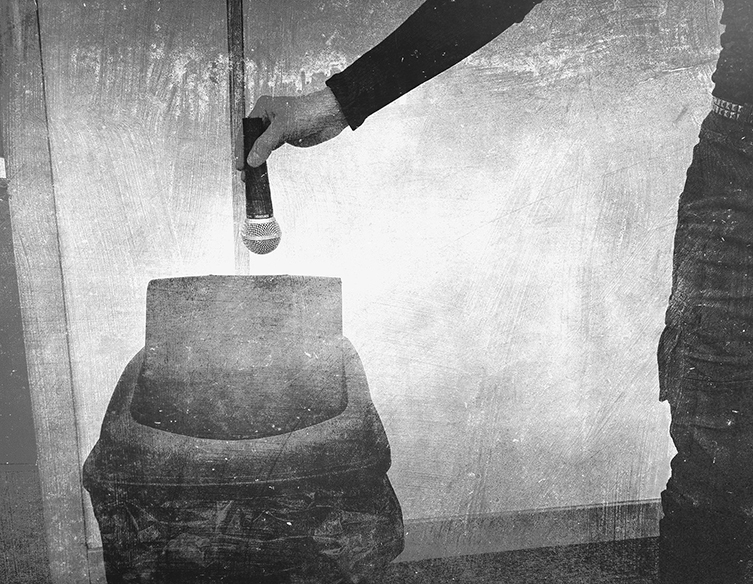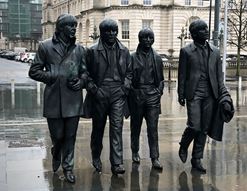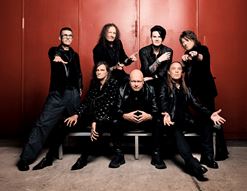Classic bands, classic lineups. It’s one of those things, isn’t it? The delicate balance of personalities and talents. You couldn’t replace any of the Fab Four, for instance, or bring in a new singer for Led Zeppelin (although I did always daydream about James Brown fronting them and inside my mind it was ace…) because there’s a fine chemistry at play here. This unique blend of egos is a big part of the reason why such bands are so universally…
What a minute! What am I talking about? LOADS of bands have ditched their singers and continued on just fine. Some have even improved! Now, I will admit that my blog title has the slight smell of clickbait around it (these bands certainly did NOT all get better), but today’s article will hopefully raise your eyebrows in consideration more than once before you’re done.

I’m going to offer up a ton of classic bands who have lost/patched/ghosted/banished their original lead vocalists and moved on to somebody else. There are many reasons for this, and that’s what I’ll be looking at today. Did these bands improve after they binned their original vocalist??
You tell me, after I’ve revealed the top bands who replaced their lead singers!
Bands Who Replaced Their Singers at a Glance
Iron Maiden
What do you mean, Bruce ‘Air Raid Siren’ Dickinson wasn’t the first Iron Maiden singer? We know he left in the 90s to be briefly replaced by Blaze Bailey (who did a fine enough job under difficult circumstances) but…there was a ‘before Bruce’ time for the Maiden?
Yes indeed, there was an original singer and Maiden fans all know him very well. Paul Di’Anno was the man who sang on the first two albums actually, and was replaced by Dickinson for the seminal Number of the Beast record.
Now, there’s no denying who is the greatest Iron Maiden singer - the definitive frontman for this mighty band - but Di’Anno brought his own unique sound to songs like Phantom of the Opera and Running Free, and therefore has rightfully earned his place in their history. RIP Paul!
AC/DC
Did AC/DC get better after Brian Johnson arrived? I wouldn’t automatically say so. Even though he’s been in the driving seat far longer than OG vocalist Bon Scott, Bon’s voice and charisma is still what many people think of when they are hearing the band. Brian is great, no doubt about it (he’s on everything from Back in Black onwards, lest we forget), but Bon’s cheeky smile and fun loving attitude will help him be remembered forever.
Black Sabbath
Who is the best Black Sabbath vocalist? What a horrible question. Technically, I suppose it might have been Ronnie James Dio or Ian Gillan, but 70s heavy metal isn’t about technicalities, it’s about vibe and soul. Ozzy sang like a demented maniac and his voice suited the material amazingly. The other guys were great too, so on this occasion, I believe I’m going to attract controversy and say that Osbourne and Dio are tied as best lead vocalists for Sabbath, even though Ozzy ultimately endured.
What do you think of that? Do you agree, or am I well and truly at it?
Linkin Park
Nu-metal uberband Linkin Park were the posterboys of millennial angst, scoring huge with hits like Crawling and One Step Closer. Somewhat uniquely, they always had two vocalists: rapper Mike Shinoda and singer Chester Bennington, who I’d say was mostly recognised as their frontman.
And a great frontman he was, using his stage persona and position to exorcise a number of personal demons that plagued him, and effectively creating a sense of catharsis for similarly-afflicted fans. To say his death by apparent suicide was a shock is probably a huge understatement.
To also say that the band reforming (mostly: a member or two has declined the reunion) and with female vocalist Emily Armstrong is also a shock would perhaps be true, too. It’s not the gender that’s in dispute here (I’d say that was quite an inspired move, and one that neatly sidesteps comparisons, to be honest) as much as the fact of them existing at all without Bennington that’s an uneasy thing.
Interestingly, in musical terms, this might be the first time we see a reuniting established band having to tune their guitars UP rather than down! Normally, older singers need the guitars dropped in pitch to hit the notes their younger selves managed, but Linkin Park are reputedly going a little higher than normal to better suit Armstrong’s voice. ‘One Step’ higher, anybody? Sorry.
Static X
When a vocalist/frontman dies and is eventually replaced, questions begin to be asked in terms of authenticity and direction. Should the new person try to be something of a copycat of the original singer? Or should the band remould themselves around this new singer, possibly risking a change to the core sound that won them their fanbase in the first place?
Industrial metallers Static-X have taken a pretty novel, very cool and somewhat scary approach to this conundrum.
In place of Wayne Static, the band's original singer guitarist with the gravity-defying hair, they now have a replacement who is suited up to resemble a laser-eyed, cyborg version of the singer! Complete with tall hair, a metal face and those Terminator-like red eyes, the new band member is known as Xer0, and has not been officially identified, though unofficially, everyone seems to understand that it’s Edsel Dope, singer for the band Dope.
This part-tribute, part-reimagining has found a mixed response, with some thinking it’s very on-brand with the band (and Wayne himself), whilst others believe it’s almost like a zombie cosplay.
Queen
How do you replace Freddie Mercury? He’s often voted as history’s greatest ever rock singer, the world’s best frontman and so on.
How do you replace him?
Well, you don’t try to replace him. Queen have (eventually) continued, but each choice has been a deliberate sidestep away from trying to deliver a Mercury Mk II, and for the obvious reason that such a task is impossible. Firstly, Queen teamed up with Free/Bad Company singer Paul Rodgers for an album and tour, and whilst he’s an undoubtedly great singer, something about the mix didn’t quite gel for the band or the fans. From 2004 (13 years after Freddie’s death) until 2009 they gave it a shot, including releasing an album and touring the world twice.
However, a more suitable replacement was found in Adam Lambert, who was actually a contestant on X-Factor! Whilst making a point of not trying to be a clone of Mercury, there are still times throughout a latter-day Queen show when you have to stop and remind yourself just who is and who isn’t on the stage. It’s spooky, it’s celebratory, and it’s Queen.
Judas Priest
When pioneering British metal juggernauts Judas Priest lost their extremely distinctive sounding lead singer Rob Halford (due to ‘miscommunication’, according to Halford), it looked like the end for the band. What were they supposed to do? Just go out and get someone else with a similar voice?
Actually yes! Step in Tim ‘Ripper’ Owens, lead singer of none other than a Judas Priest tribute band! The American singer led British Steel, a JP covers band, and a video tape of him performing found its way to the band, who promptly hired him. Talk about a promotion?!
This lasted from 1996 until 2003, when Halford rejoined the band. Owens (I’m not calling him ‘Ripper’) has also sung for Iced Earth and Yngwie Malmsteen’s Rising Force, as well as his own solo material, in the years since.
Stone Temple Pilots
Scott Weiland was one of the last of the real rock stars. He walked the walk, dressed subversively and behaved in the time-honoured manner expected of rock singers.
The trouble was, his Stone Temple Pilots bandmates were sick of it and couldn’t tolerate his ways any longer, particularly his drug use and brushes with the law.
Weiland left, went on to form Velvet Revolver, went back to STP and then got sacked. Years later, he died from an accidental overdose that was no less sad for its predictability. STP, though, were determined to record and tour as a functioning band. Initially, they recruited Chester Bennington from Linkin Park (see above) to fill Weiland’s shoes. Even if those shoes were a difficult fit, I’d be surprised if anybody didn’t at least enjoy Benington’s take on the songs, which he performed for a few years when Linkin Park were on hiatus.
Then in 2017, they recruited vocalist Jeff Gutt, another singer who came to prominence via the X-Factor TV show. Gutt is a very capable singer, and it seems that the band have chosen to make him something of a Weiland tribute in his performing style, perhaps proving that the original vocalist was the correct one all along.
Alice in Chains
It’s quite a brutal thing to look at all of the Seattle bands from the early 90s and check out how many of the musicians are no longer with us. One such shooting star was Alice in Chains vocalist Layne Staley, who died of an overdose in his home back in 2002, aged only 34.
The band stopped for a number of years, and only cautiously regrouped after their friend William DuVall stepped in on vocals for a tribute show and proved a great match for the band’s sound. The relationship developed, and the band have released three pretty great albums since they regrouped.
What’s interesting is that DuVall isn’t in any way trying to sound like Staley, and yet the ensemble still definitely sound like ‘Alice in Chains’.
The thing about AIC is that they always had two co-vocalists: although Staley was undoubtedly the frontman, co-writer and guitarist Jerry Cantrell handled almost 50% of the vocals anyway, so when DuVall’s voice blended with his, it may have sounded different from before, but it was equally effective and equally haunting.
Should Singers Be Replaced?
Band members get replaced all the time. Look at the Red Hot Chili Peppers, or even the Rolling Stones. Though it hurts to say it, guitarists (and drummers, bassists, keys players…) are easier to replace than singers. Less of their identities are as closely woven into people's connotations of what the band is and what it means to them.
Choose your favourite band and then put any other singer in there in place of the original vocalist. Bob Dylan singing for The Who! Kurt Cobain singing for Metallica! Everything changes!
Why is that? I don’t know, but as we’ve seen today, removing the lead singer from a band changes the situation in innumerable ways: for the band, their fans and the whole legacy of the music involved. Should bands replace their singers or just disband and start a new fresh band with a different name? There are no answers, only lots of questions and some great music. Maybe that’s fine too?





















